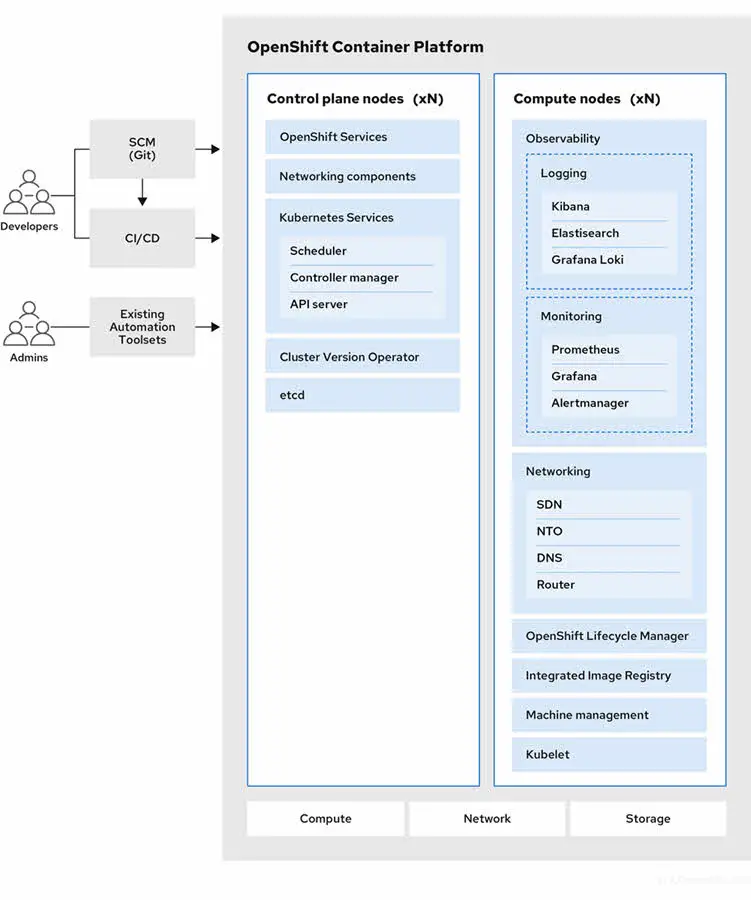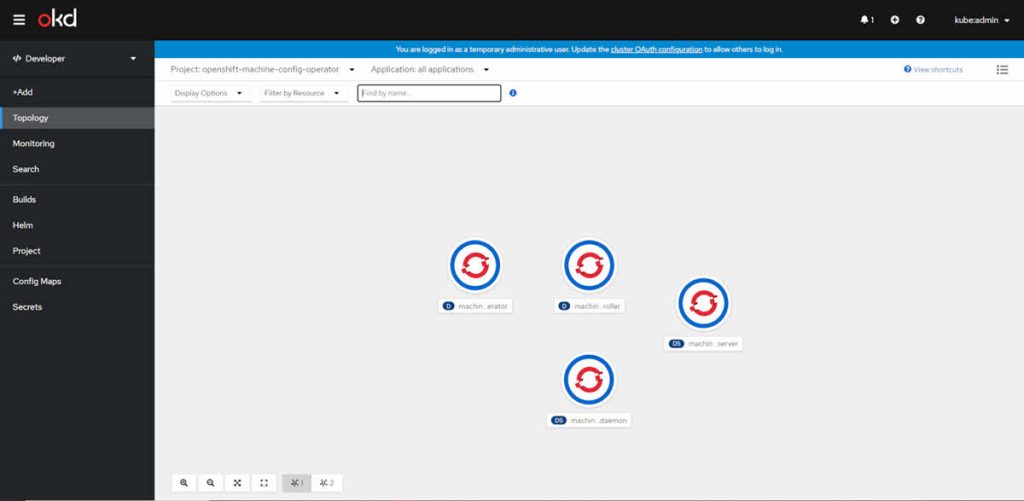OKD: Unleashing the Power of Kubernetes for Open-Source Innovation
Kubernetes has emerged as a transformational force in cloud-native computing, revolutionizing the way applications are written, deployed, and managed. OKD, the open-source upstream of Kubernetes, is at the heart of this change, enabling developers and organizations to take advantage of the potential of Kubernetes without vendor lock-in.
OKD is a Kubernetes community distribution designed for continuous application development and multi-tenant deployment. It extends Kubernetes with developer and operations-focused tools to enable rapid application development, easy deployment and scaling, and long-term lifecycle maintenance for small and large teams. In GitHub and the documentation, It is also known as Origin. That makes it simple to launch Kubernetes on any cloud or bare metal, simplifies cluster management and updates, and gives all of the tools you need to succeed with containerized apps.
It also serves as the upstream code base upon which Red Hat OpenShift Online and Red Hat OpenShift Container Platform are built.

OKD: A Kubernetes Distribution with a Difference
It is a thriving community of developers, contributors, and enthusiasts dedicated to promoting innovation and advancing the future of cloud-native technology. Unlike commercial Kubernetes distributions, which can have high prices and proprietary features, OKD stays true to its open-source heritage by providing a free, enterprise-grade Kubernetes platform.
Positive Impacts of OKD
Its influence on the cloud-native world is evident. It has given organizations the capacity to achieve agility, scalability, and cost-efficiency in their IT operations by providing a solid basis for designing, deploying, and managing containerized applications.
OKD streamlines the development lifecycle, allowing developers to focus on designing creative apps rather than becoming mired down in infrastructure concerns.
Its self-healing features and automated deployments ensure that applications remain highly accessible and robust even in the face of failures or modifications.
Reduced infrastructure costs for organizations running cloud-native applications, its effective resource utilization and optimized resource scheduling result in significant cost reductions.
Democratizing Cloud-Native technologies, its open-source nature and extensive documentation make it accessible to a broad range of users, from novices to seasoned IT professionals.
Negative Perceptions of OKD
Despite its apparent virtues, it has had significant difficulties, which have frequently stemmed from misconceptions and a lack of knowledge.
Complexity: Some consider to be a difficult platform that requires a high learning curve and specialized expertise to run efficiently.
Community-Driven assistance: Its major source of assistance is its active community, which may not always be as responsive as commercial help solutions.
Its open-source nature may limit its interaction with proprietary tools and services provided by certain companies.
Addressing Negative Perceptions and Embracing Its Benefits
These perceived difficulties can be solved by education, community engagement, and a mentality shift.
Education and Training: Investing in education and training materials can assist in demystifying OKD’s intricacies and empowering users to successfully use its potential.
Active Community Participation: By being involved in the community, you get access to a wealth of knowledge, shared experiences, and collaborative problem-solving opportunities.
Vendor-Neutral Approach: Because it is open-source, organizations can select the tools and services that best meet their needs, encouraging a vendor-neutral environment.
OKD: A Platform for Open-Source Innovation
OKD’s influence extends beyond the technical sphere, creating an open-source innovation and cooperation culture. It has enabled developers to freely create and share their works, resulting in a robust ecosystem of open-source tools and applications.
Contributions from the Open-Source Community: The open-source nature of OKD invites developers to contribute to its development, impacting the future of the platform and the broader cloud-native ecosystem.
OKD’s vibrant community serves as an innovation hub, where ideas are discussed, solutions are produced, and the platform’s capabilities are constantly increased.
OKD’s success has fueled the adoption of open-source technology across industries, helping organizations to innovate and survive in the digital age.

Conclusion: Embracing the Future with OKD
OKD exemplifies the power of open-source cooperation and innovation. It has democratized cloud-native technology access, enabled developers to create breakthrough applications, and spurred the establishment of a robust open-source ecosystem. It stays at the vanguard of the cloud-native environment, adopting cutting-edge technologies and promoting open-source innovation to influence the future of cloud-native computing.
Further Reading
KubeVirt: The Next-Gen Virtualization Solution for Kubernetes – Run Containers and VMs Side-by-Side
Kata Containers, Container with VM Isolation
VMware Photon OS – Best OS for Kubernetes and Container Host
[Review]: What is Container Linux?
Free and Open Source – VMware PhotonOS 5.0
MicroVM and Firecracker: Discover Advantages and Disadvantages











Interested in collaborating or partnering with your organization. Need respective team contact details.
You can communicate with me: [email protected]